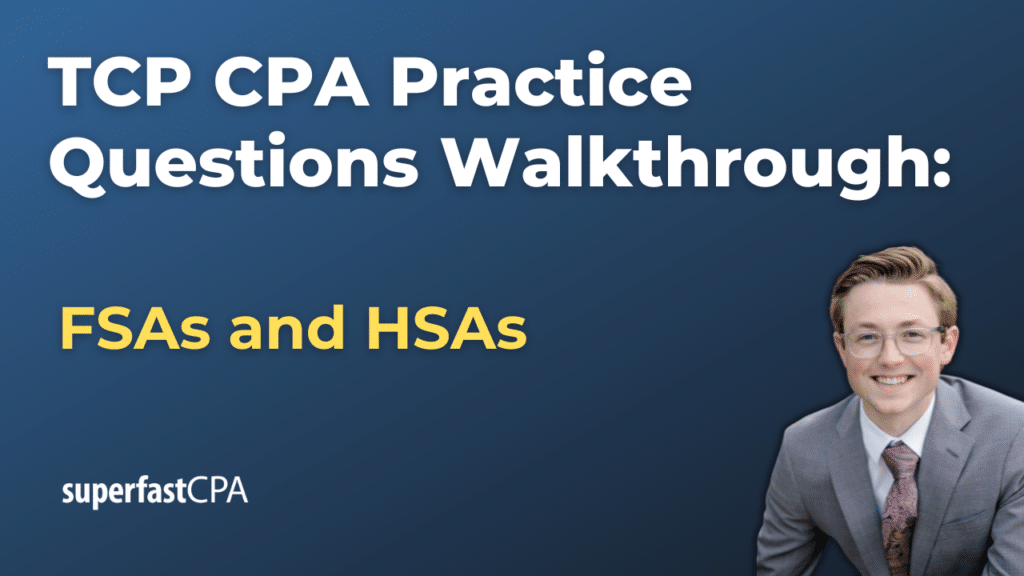In this video, we walk through 5 TCP practice questions teaching about tax savings using FSAs and HSAs. These questions are from TCP content area 1 on the AICPA CPA exam blueprints: Tax Compliance and Planning for Individuals and Personal Financial Planning.
The best way to use this video is to pause each time we get to a new question in the video, and then make your own attempt at the question before watching us go through it.
Also be sure to watch one of our free webinars on the 6 “key ingredients” to an extremely effective & efficient CPA study process here…
Tax Savings Using FSAs and HSAs
Health Savings Accounts (HSAs) and Flexible Spending Accounts (FSAs) are both types of tax-advantaged accounts that help individuals save for medical expenses, but they have distinct rules and benefits. Understanding these differences can help in deciding which is most suitable for an individual’s financial and health situation.
Health Savings Accounts (HSAs)
How HSAs Work: HSAs are available only to individuals enrolled in high-deductible health plans (HDHPs). These accounts allow pre-tax contributions, which reduce taxable income. The funds in an HSA can be invested, and the investment growth is tax-free. Withdrawals for qualified medical expenses are also tax-free. One significant advantage of HSAs is that the funds roll over indefinitely; there is no requirement to spend the funds within any time frame, making HSAs also useful as a long-term savings tool, potentially extending into retirement.
Example:
Suppose Alex contributes $3,000 to his HSA and is in a 30% tax bracket. His tax savings would be calculated as follows:
- Tax Savings: $3,000 x 30% = $900. Thus, by contributing to an HSA, Alex reduces his tax liability by $900.
Post-Retirement Benefits: After the age of 65, funds can be withdrawn for any purpose without penalty, though non-medical withdrawals are subject to income tax, much like a traditional retirement account.
Flexible Spending Accounts (FSAs)
How FSAs Work: FSAs are employer-sponsored and can be used by any employee without regard to the type of health insurance plan they have. Like HSAs, contributions are made pre-tax, which decreases taxable income. However, FSAs have a “use-it-or-lose-it” rule, meaning funds generally must be used within the plan year. Some plans allow a carryover to the next year or provide a grace period of up to 2.5 months after the end of the plan year to use the funds.
Example:
If Jordan contributes $2,500 to his FSA and is in a 25% tax bracket, his tax savings would be:
- Tax Savings: $2,500 x 25% = $625. By contributing to his FSA, Jordan reduces his tax liability by $625 for the year.
Limitations: Unlike HSAs, FSAs do not allow the account balance to be invested, and they are not portable if the employee changes jobs or leaves the employer.
Key Differences
- Eligibility: HSAs require being enrolled in an HDHP, while FSAs require the FSA to be offered through the employer.
- Rollover Rules: HSA funds roll over completely each year without penalty, whereas FSA funds mostly adhere to a use-it-or-lose-it policy with limited exceptions.
- Portability: HSAs are portable and remain with an individual regardless of employment change, while FSAs are generally not portable and are tied to the employer.
- Investment Opportunity: HSAs can be invested similar to retirement accounts, growing tax-free over time, whereas FSAs cannot.
Both HSAs and FSAs offer significant tax advantages for covering medical expenses. The choice between an HSA and an FSA often depends on individual health insurance plans, financial goals, and the stability of annual medical expenses. Those looking for a long-term savings option that offers investment growth may prefer an HSA, while those with predictable annual medical expenses and who benefit from immediate reductions in taxable income might opt for an FSA.













